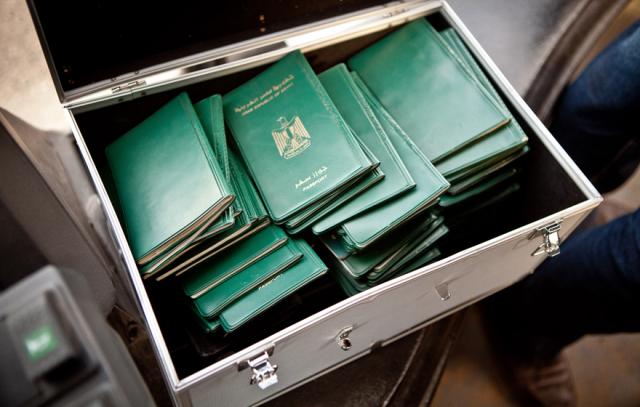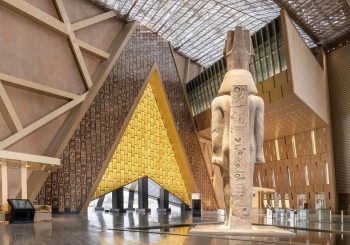The revocation of Egyptian nationalities has made to the headlines quite a few times recently. From Mohamed Soltan who was deported to the US on May 30 upon revoking his Egyptian nationality, to Mohamed Fahmy, the AJ journalist who revoked his Egyptian nationality in hopes of regaining his freedom after over a year in prison, public responses have varied quite greatly.
But while both instances are related to legal discourse, other Egyptian youth who still greatly enjoy their freedom have various takes on the matter as well.
Ahmed Abouzayed, 27, Architect
Before the revolution, I used to think of moving to Australia where I can start anew. But when the revolution erupted, my mindset started to change. Yet to be honest, I still revisit the nationality issue every now and then, wishing I could leave.
Revoking my nationality though is a tricky matter because if I had a dual nationality, I probably wouldn’t be using my Egyptian one. But if I were asked to pick, I would then revoke it.
This country hasn’t done anything for me. Even when my father was in trouble in a foreign country, the Egyptian side didn’t come to his aid, but rather a third party who intervened and helped him out.
I can’t judge anyone who revokes his nationality because that’s a relative matter and depends on the conditions which lead him to such decision. Maybe they’re escaping injustice or fleeing a failed national system. Whatever the reason, they have the right to be able to turn over a new leaf elsewhere.
Sarah Chédid, 25, Gymnast and Engineer
Given I already hold another nationality, I won’t ever give up my Egyptian nationality. It isn’t because Egypt is a piece of heaven, but because whatever [mess] happens in Egypt also happens in other countries across the world, and sometimes even worse. The only difference is that the spotlight is always directed at any turbulence taking place in Egypt, whereas abroad, corruption keeps a low profile.
It is understandable that people would do anything to secure a better life and a better future for themselves and their families, but there must be limits to everything. It is one thing to make some compromises to achieve certain good, but if you easily give up any value you ever held, then you stand up for nothing. There must be principles, and one must hold on to them.
Anonymous, 27, Freelance Journalist
I would revoke it in a heartbeat provided I don’t have to live in this country anymore.
I think that a person who revokes his Egyptian nationality is a hero, (not Sultan though, he’s hypocrite.) But any other would be a hero.
I’d give my Egyptian nationality up because it’s always a potential hazard. And I don’t take pride in “nationalism” and all that nonsense.
For me, nationalism is an artificial social construct of a bygone era that was made to be a vehicle of propaganda for pure political purposes. But there is nothing organic about nationalism and it doesn’t mean anything.
We are all human. It doesn’t matter what the colour of your passport is.
Anonymous, 24, MA Student
I wouldn’t give up my Egyptian nationality. Part of me is still proud to be Egyptian. We have a great heritage which I will always be proud of.
Ideally, I would like to have a dual citizenship. That would be perfect for situations when holding an Egyptian passport might cause me harm, impose unnecessary difficulties, or even humiliate me.
The benefits of having a dual citizenship is beyond travel and the privileges the passport earn you. There are other aspects such as knowing that my family and myself would be safe if anything happens in my country [Egypt].
Even though I believe everyone is free to make their own choice on such matter, I do think that they’d regret it at some point when they realize how great Egypt is.
Dina Kamal, 24, Line Producer
I wouldn’t revoke my nationality. I prefer not to judge because everyone has his/her own reasons. But in general, I see it as giving up a part of your identity and your roots which I believe is wrong. After all, you won’t belong to the other nationality no matter what and people will still treat you as a ‘stranger’ most of the time.
Anonymous, 30, Engineer
This is a very tricky question. I used to think I knew the answer until 2013.
Back then I would have not thought of revoking my nationality. I would have even blamed those who do. But now, it is quite different, and I can fully understand the reasons why people look forward to it. Especially with the way the country’s youth are being treated.
Even though such decision is quite situational, our beloved country and its leadership play a core part in the changing mindset of the youth. Things have changed.
Now, the youth are being killed in cold blood. Previously, it used to be being ignored or underestimated, or even detained until you find an insider to get you out of trouble. Now, you’ll get killed straight away.
Anonymous, 27, Pharmacist
Loving a country is in one’s heart. It has nothing to do with which passport you hold. Passports as good as the privileges they give you.
Personally, I think such decision [to revoke your nationality] depends on the situation. It’s quite hard to certainly say, because it’s always different in theory than it is in actual life.
It mostly goes back to whether you can withstand the situation or not, psychologically, emotionally and physically.
You can’t judge anyone unless you have their exact same mindset, and have been through the exact same situations which will never happen.
Nevertheless, I believe giving up your nationality will cause some sort of remorse. It isn’t an easy thing to do, to cut off your roots. It’s a matter of identity. It’s part of who you are and where you belong.
I wasn’t raised in Egypt, and it wasn’t till college that I returned, but nevertheless, I always had this bond with the country.
Even though I’m unhappy with the country, but whenever one thinks that they may travel for good, weird emotions come up.






Comments (21)
Hmmm, revoke your Egyptian nationality and live in comfort and freedom in Canada, the USA, or Europe, or spend years being tortured in an Egyptian hellhole prison.
Tough choice, isn’t it?
Let’s face it, even without the threat of prison, 90% of Egyptians would revoke their nationality for an EU, US, Canadian or Australian passport and a ticket out. The 10% who would stay are the ones profiting in the current oligarchical system.
And 90% of those Egyptians would do better in those countries with freedom and opportunity.
So basically according to many Egyptians, the nationality is only about benefits and stuff. Alright then, Somali people or let’s say Syrians should all revoke their homeland nationalities.
These people are f**king !d!ots. The type of people who want to set back and be granted a check from the state every week for doing jack $h!t.
Egyptian Streets, please try interviewing everyday Egyptians instead of these so called revolutionaries anti coup f**ktards.
hahaha you want to ask people who will never have a chance of getting anohter nationality if they would revoke their egyptian one this will not give you the right picture
anyone who worked hard for an degree or skill have no future in egypt thats why if they had the choice they will leave because they would be able to build their future something you can’t do in egypt for the last 60 years !
your nationalist ideology doesn’t allow for people to see their passport as an piece of paper instead of a proud national document ! Go die with your generals who made egypt a graveyard for egyptian talent !
You say that as if Egypt is the only country int eh world suffering from an economic crises. Ignorant cunts like you think Europe is paved with gold filled with jobs. Its not.
A passport is a peace of paper but for these f**ktards to say they don’t believe in man made borders is strength out retarded. The reason why there are no jobs in Egypt is because of the current economic climate caused by years of political turmoil. Up until the March conference, nobody wanted to invest in what they thought was a sinking ship.
If people become patient and give the goverment the opportunity to finish the current national projects, jobs will return over time. Constantly bragging and expecting $h!t to change in a week is moronic.
egypt is suffering from an economic crisis just like the rest of the world but above that it is suffering of a wealth distribution problem that after 60 years have reached its limits ! the west is not a place filled with milk and honey but it is a place filled with the needed talent and human capital able of creating growth and development !
give me 1 time period in the last 60 years of military rule where egypt had a decent economic result where people could say that if these results could be consolidated we could become an emerging country ! you won’t find any time period like that ! Mubarak had good macro economic numbers but that never resulted in anything good for the man in the street !
the problem of egypt is not the economy or the lack thereof , the problem is the redistribution of wealth that is being hijacked trough the collaboration of the elite and military who have total control of the state and the country’s assets and politics as they are the majority in parliament !
the industrialized world are brain draining the underdeveloped world anyone with intellect or skills are moving out not because they hate their country but because they know that how egypt is currently being ruled and organised that everything is void of stability and peace , people have been waiting since the generals took over the reigns of the king to see egypt flourish !
the problem is structural and not provisional